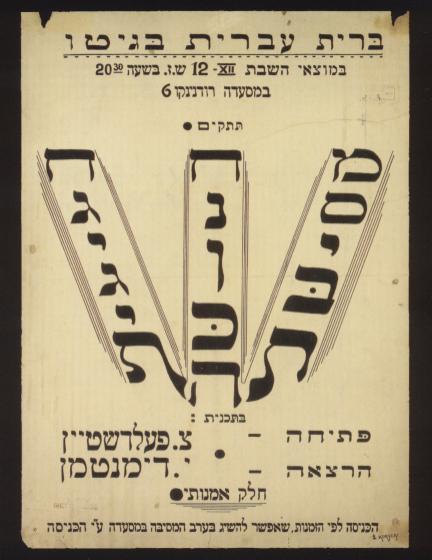| | Vilna Ghetto Posters |
| The Vilna Jewish State museum presents a unique archival collection of 16 authentic posters from the Vilna ( Vilnius ) Ghetto. |
| At the end of the summer of 1944, after Vilnius had been liberated from the Nazi plague, a group of partisans – former Ghetto prisoners – returned to their devastated homeland, where, among the ruins of the Jewish quarter, in various hiding places, and from the mountains of waste by the paper factory, they found and salvaged a great number of valuable Ghetto documents, including more than 200 Ghetto posters. Torn and ravaged, victims, like the people of the Ghetto, of violence and brutality, they are the chronicles of the cultural and spiritual life of the Vilna Ghetto. Like a mirror, they reflect the contrasts – cruelty and goodness, despair and endurance, egoism and sacrifice – of the tragic and isolated world of the Ghetto. |
 |
 |
 |
|
The source of the phenomenon of cultural activity in the Vilna Ghetto are the spiritual and cultural values created there throughout the centuries. Vilne, Yerushalayim de Lita – famous for its synagogues and yeshivas, teachers’ seminaries and schools, the YIVO Institute for Jewish Research an the Strashun Library, the “Jung Vilne” literary group and the “Vilner Trupe” theatre group, newspapers, publishing and printing houses – was a wonderful citadel of Jewish religious and secular culture. The 20th century was witness to both – its pinnacle and its destruction. Herded into the Vilna Ghetto, the last generation of litvaks brought with it tremendous intellectual potential. Its spiritual elite initiated a broad and multifaceted cultural activity as Resistance against the Nazis, against humiliation and dehumanization, a struggle for the nation’s honour and its survival. Under its leadership, a great many institutions were created and functioned actively within the Ghetto: health care and hygiene facilities, training and educational institutes, childcare and social services, professional and artistic societies, theatres, clubs… | | | Modified: 1/4/2007 1 |
|
| | | | | Information | | 2017.03.01 | |
|
If you want to order a guided tour or educational programme please contact us in advance:
tel. +370 60163612,
email: muziejus@jmuseum.lt
***
If you want to order an educational programme, please contact us at: +370 5 212 0112,
+370 6 8986 191 or via email muziejus@jmuseum.lt
***
Tolerance Center
(Naugarduko St. 10/2)
working hours:
Monday,Thursday: 10:00-18:00
Tuesday, Wednesday: 10:00-18:00
Friday: 10:00-16:00
Saturday-closed,
Sunday: 10:00-16:00
***
Holocaust Exposition
(Pamėnkalnio St. 12)
working hours:
Monday-Thursday: 9:00-17:00
Friday: 9:00-16:00
Saturday-closed
Sunday: 10:00-16:00
***
Memorial Museum of Paneriai
(Agrastų St. 15, Aukštieji Paneriai)
working hours:
Monday-closed
Tuesday–Sunday 9:00-17:00
From October until May the Memorial Museum is open by appointment only.
If you are interested in visiting the museum/the memorial with a tour guide, please contact us at least a day in advance at
+370 699 90 384 or via email mantas.siksnianas@jmuseum.lt
***
|
|
| | | | | | |  | |  |
|


